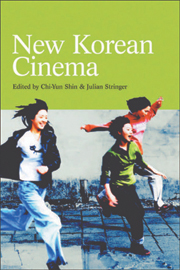Book contents
- Frontmatter
- Contents
- Notes on the Contributors
- List of Illustrations
- Introduction
- Part I Forging a New Cinema
- Part II Generic Transformations
- Part III Social Change and Civil Society
- 11 Peppermint Candy: The Will Not to Forget
- 12 The Awkward Traveller in Turning Gate
- 13 Memento Mori and Other Ghostly Sexualities
- 14 Interethnic Romance and Political Reconciliation in Asako in Ruby Shoes
- Glossary of Key Terms
- Bibliography of Works on Korean Cinema
- Websites
- Index
12 - The Awkward Traveller in Turning Gate
from Part III - Social Change and Civil Society
Published online by Cambridge University Press: 05 August 2013
- Frontmatter
- Contents
- Notes on the Contributors
- List of Illustrations
- Introduction
- Part I Forging a New Cinema
- Part II Generic Transformations
- Part III Social Change and Civil Society
- 11 Peppermint Candy: The Will Not to Forget
- 12 The Awkward Traveller in Turning Gate
- 13 Memento Mori and Other Ghostly Sexualities
- 14 Interethnic Romance and Political Reconciliation in Asako in Ruby Shoes
- Glossary of Key Terms
- Bibliography of Works on Korean Cinema
- Websites
- Index
Summary
Kim Sŭng-ok, one of the most celebrated writers of the post-Korean War era, as well as being one of the first generation of writers to be educated in the national language after Korea's liberation from Japan, is perhaps most famous for his short story: ‘Seoul: Winter, 1964’. Written only a few years after the 19 April student uprising of 1960 that toppled the corrupt Syngman Rhee government and the 18 May coup d'état of 1961 which ushered in a military dictatorship that ruled for three decades, the author's satiric perspective is mirrored in the two main characters, Kim and An, who meet at a street tavern. They are both failures: Kim flunked his military academy entrance exam and An was a student activist of futile political demonstrations. As they eat roasted sparrows and drink cheap alcohol, the two strangers trade lines that neither produce thematic significance nor forge a strong relationship. The conversation constantly trails off, producing awkward intervals. Breaking one of these silences, Kim randomly begins, ‘Of the street lights that are lined up in front of the P'yŏnghwa Market, the eighth one from the east end is not lit …’ All of a sudden, a look of delight appears on An's face. He responds, ‘There were thirty-two people at the West Gate bus stop; seventeen were women, five were children, twenty-one were youths, and six were elders’ (Kim Sŭng-ok 1993: 88–9).
- Type
- Chapter
- Information
- New Korean Cinema , pp. 170 - 179Publisher: Edinburgh University PressPrint publication year: 2005



